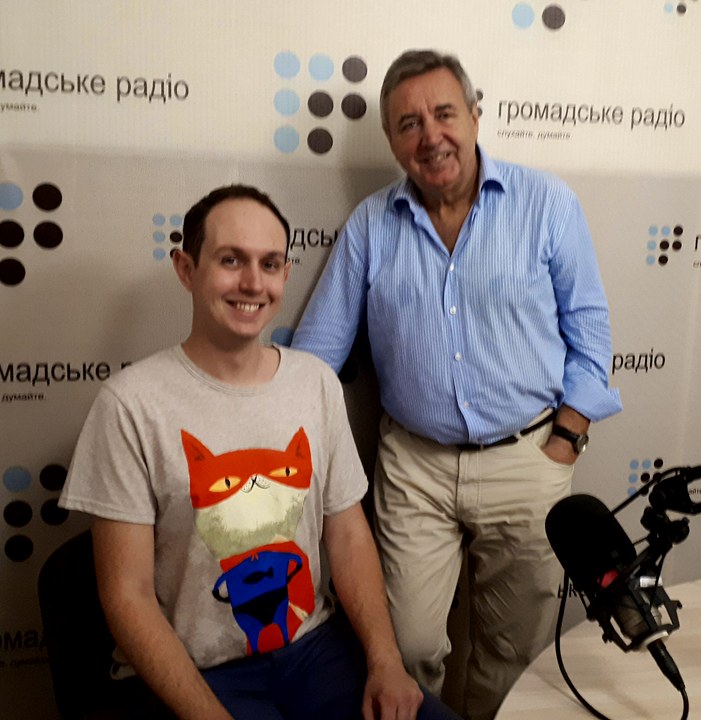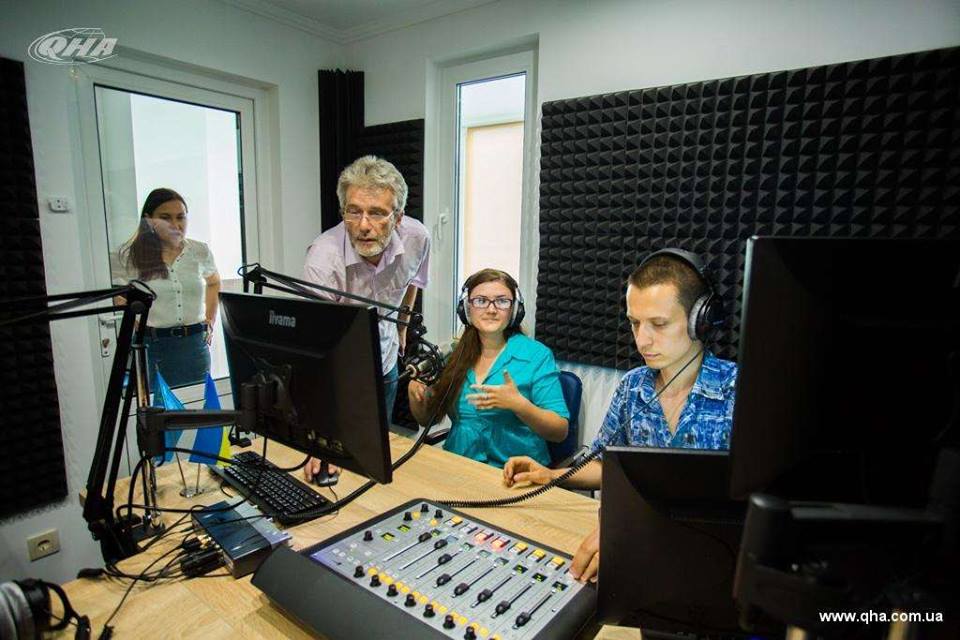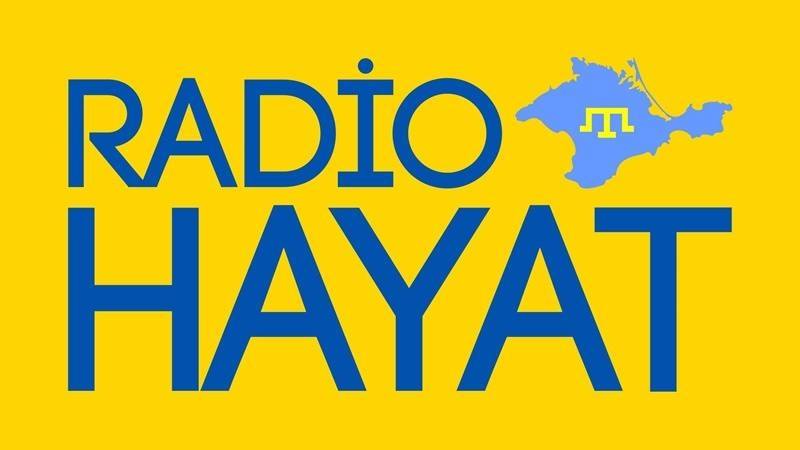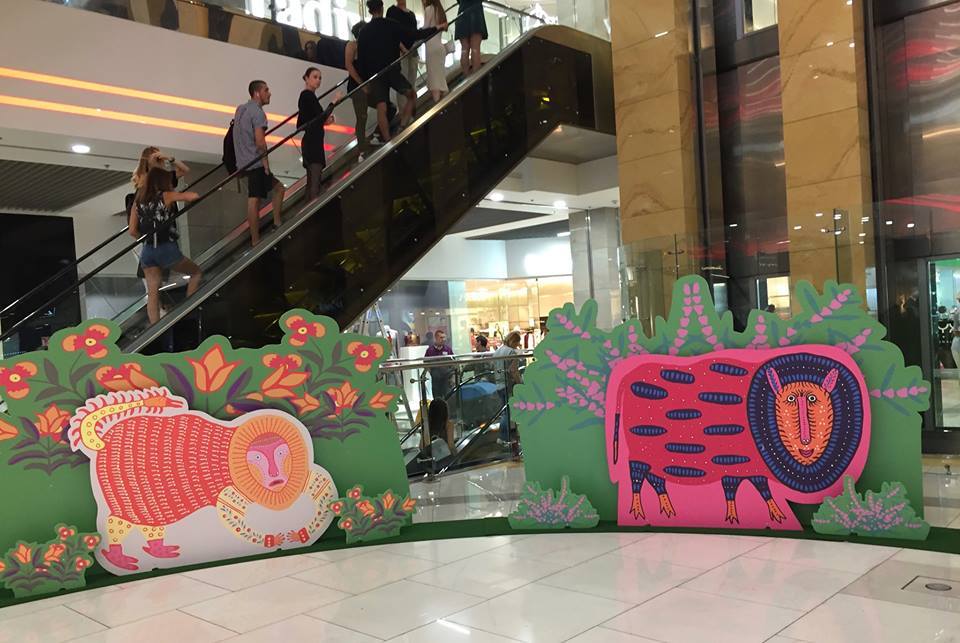
Ukraine’s millennial projectors
Energetic millennial Yarema Dukh, Foreign Media Coordinator and Special Assistant to the Press Secretary of the President Poroshenko, speaks to Bohdan Nahaylo

Hello and welcome to this week’s Ukraine Calling programme. I’m Oksana Smerechuk for Hromadske Radio in Kyiv.
NEWS
CULTURE and MUSIC
LOOKING FORWARD
Hromadske Radio is independently funded. We are appealing for funds through a crowd funding initiative. Should you feel inclined to donate, you can do so here using Wayforpay.
Feature Interview: Energetic millennial Yarema Dukh, the President’s Foreign Media Coordinator, speaks to Bohdan Nahaylo
Nahaylo: Welcome to our In Depth discussion this week on Hromadske Radio’s weekly program Ukraine Calling. I am Bohdan Nahaylo in Kyiv. My guest this week is a young man who holds a very responsible position. It’s Yarema Dukh, Foreign Media Coordinator and Special Assistant to the Press Secretary of the President of Ukraine. Welcome, Yarema, to the program.
Dukh: Thank you for having me.
Nahaylo: Let’s start in a traditional way. Maybe just a few words about yourself. How did you end up in such a high profile position given the conditions that Ukraine finds itself in.
Dukh: To make it short, I am from a beautiful city in Western Ukraine L’viv. I had lived there for entire life. But when Euromaidan has started in 2013, my friends and I started traveling to Kyiv a lot helping Maidan’s Self-defense called ‘Samo-oborona.’ When it all ended…
Nahaylo: Just a minute, don’t be so modest. I saw you as a press secretary of Maidan Samo-oborona.
Dukh: For some time, a few weeks, I was a press secretary of the Maidan. Normally we had contact with foreign media. Through the entire revolution, all big Ukrainian media outlets already had their own sources in units called sotnias [Ukrainian term military term company, 100 or so individuals] It wasn’t an issue from them to get some information or news from Samo-oborona. They created their own network and we did not interfere with this because we literally did not have time for this. But from late November, or I would say early December 2013, a lot foreign journalists started to come to Kyiv. Some of them were representatives of Moscow Bureau of American and British media outlets. They were well versed in the whole situation and knew they wanted to speak to A, B, C names, and to go to 1,2, 3 locations. But there were also a lot of journalists who were coming to Kyiv part-time asking “What’s up, guys?” and we were looking into their cases and trying to understand what is going on.

Nahaylo: At that stage, Yarema, did you feel it was important for the activists on Maidan to speak with one common voice sending the same message?
Dukh: Definitely. It was one of the reasons why I volunteered to work with the media. In December 2014 I understood for the first time that Russians are not only transmitting news, they are making things up. It was the first ring bell when we started to think that Russians are paying attention to something bigger.
Nahaylo: You mean distorting news, fake news and what we call the hybrid wall…
Dukh: Of course.
Nahaylo: So, you are on the Maidan, in the middle of it, and shortly afterwards we have tragic events – mass killings here. Yanukovych is ousted. And suddenly not only Crimea occupied but the Russian aggression continues in Donbas. I can see from your CV that you end up somehow, and it would be interesting form us to hear, in National Security and Defense Council as a press secretary of Secretary of NSDC.
Dukh: That’s correct.
Nahaylo: That’s quite a change.
Dukh: In late February 2014, when Yanukovych was ousted from the country, Andriy Parubiy, at that time leader of Self-Defense, was appointed as Secretary of National Security and Defense Council (NSDC). We had some history between us, and he invited me to join his team at NSDC. The only possible answer for me was “yes.” because I was involved in the Revolution. My friend was one of the Heavenly Hundred [peaceful demonstrators killed during the Maidan protests]. And I thought it was part of my job. Frankly, I though that it would be for half a year, and then things will settle down. We would start processes, and change the management in major governmental structures, and I would go back home. But few days after we got into the offices, Russians seized Crimean Parliament, and everything has started.
Nahaylo: Was there a difference for working for civil society as an activist and working for what has become an official structure? You are now working for the new government. Would there be apparent changes or the things were run very much in an activist spirit?
Dukh: I have been Ukrainian Scout, Plastun, for more than 10 years or even 15, not sure about that already. I have been involved in social activism for half of my life, since I studied at L’viv University. I had been working for almost 4 years at L’viv City Council for Promotional Office promoting L’viv not only on domestic market but also abroad. What I have seen at NSDC, and later in the Presidential Administration, is a high level of responsibility. Because it’s one thing to talk about a scouting organization, or some other NGO, and another level of responsibility when you are speaking on behalf of the entire country.
Nahaylo: Did you feel at that stage when we were confronted by Russian aggression first time in Crimea, and then in Donbas, that the world was interested, that it cared, that it wanted to know more?
Dukh: Definitely. I know this for sure because we had dozens of requests every day in March, and later on in summer 2014 when all leading media outlets of the English, and not only English speaking, world were sending their mobile crews to Ukraine, first to Crimea, then to Donbas, then to the MH17 tragedy sight. I can’t say we were not on the map. I would say even Euromaidan and other tragic events in 2014 in 2015 literally put Ukraine on English speaking map. Twenty years ago what did they know about Ukraine? Chornobyl, Klychko, and it’s probably all.
Nahaylo: We had had an Orange Revolution, and for a time we were on the map and then faded off the map again. Was there a danger after Maidan when we confronted with hybrid warfare and the distortion of the facts, presenting Ukrainians as fascists, as, you know, somehow staging a coup and ousting a legitimate president, that we would lose that battle for support and attention?
Dukh: Well, I would say that almost 15 years ago, when we had an Orange Revolution, at that time leadership did not pay so much attention to the communications. Because, frankly, all those people who can talk to journalists, who can speak with the nation, they have been on the market, I would say. But at that time, the leadership did not pay a lot of attention to this. Thankfully, nowadays, the President, the Prime Minister, a bunch of ministers are hiring high-class professionals to share what they are doing, to explain to the nation and the other world what is happening in the country.
Nahaylo: So is this public relations, public diplomacy, or how would you describe it?
Dukh: I would say it is all together combined, because while we are facing hybrid warfare from the Russian Federation, we can’t respond only with press releases. Cultural diplomacy is another thing. The Minister of Foreign Affairs and Presidential Administration are paying huge attention to this. Also, NGOs like Ukraine Crisis Media Center are paying a lot of attention not only to share press releases about what is going on in the country, but also to perform some unexpected projects. For instance, they brought a huge billboard at the G20 meeting at Hamburg this summer. Or Twitter Ukraine, where we are sharing a lot of news, and sometimes trolling Russia when they are trying to share fake news.
Nahaylo: OK, let’s just stay with your role with the National Security and Defence Council of Ukraine. So, you were presumably there when 3 years ago the Ilovaysk tragedy, massacre, killing during the retreat of the Ukrainian forces, happened. How serious was a challenge to deal with it, to explain what was happening to the outside world?
Dukh: Well, frankly, when I joined NSDC I thought that we will be in power, and that we will help to establish low cost airlines lines between communities. To establish press trips for Ukrainian journalists from other regions to other cities. Because I believe that [part of the reason] we are having this war, and Russia initially benefited, [is] from lack of communication among Ukrainians and Ukrainian regions. I have been to Donetsk only once in my life when lived in L’viv. It took me 26 hours by train one way to get there. That is more than to fly to DC or to Toronto. That is crazy. Things turned in another way and I filled my English vocabulary with words like bullet-proof vest, armoured personnel carrier and all of that stuff. Frankly, we have established, from scratch, communications with the outside world. And not only with the outside world, but with domestic market as well. Because we started to explain what is happening in Donbas. We started to share, every day, press releases with daily updates on what is going on.
Nahaylo: When you say “we,” you were with the Presidential Administration. How well was the coordination with the Foreign Ministry, with the army, the security forces, with the Prime Minister’s office function? Are you speaking with one voice, do you coordinate your message, do you meet regularly amongst yourselves, the official and de facto spokespersons for the country?
Dukh: When I am saying “we” it‘s not only NSDC, it’s also Ministry of Foreign Affairs (MFA), it’s at that time of acting President Turchynov and his team [spring 2014], and also other power centers. We started to meet tin spring 2014 once in few days just to coordinate our efforts. Nowadays, I would say it is easier, because we are already working as one team for some time. Namely, the Presidential Administration, MFA. The whole government is playing as one team, involving also NGOs working in the same field, namely Ukrainian Crisis Media Center.
Nahaylo: I asked that question because in many countries, not just in Ukraine, you feel that there are tensions and competitions between ministries and agencies vying for influence, for visibility. Is that under control in Ukraine today? Do you feel that in the area of projecting the right image of Ukraine abroad that it’s done in some harmonized way?
Dukh: I would say that throughout governmental structures there are those that want to be in the public sphere, who want to be present in media, and those who do not want to be in media. Normally, their fields of responsibility do not cross. So we are normally sharing fields where we are working as public relations specialists. Frankly, we do know each other, and when there are some questions we just simply call or text our counterparts and ask, “Hey, guys, what is your response on, let’s say, recent controversial publication in The New York Times about allegedly Yuzhmash helping North Korea to start their missile program. We’ve been in close coordination with NSDC, with MFA, with the other counterparts, just to coordinate what we are saying and also helping them to share the message.
Nahaylo: I see also from your CV that from the beginning of 2015 you joined the Presidential Administration’s Foreign Media Unit. Was it a big change from working for the National Security and Defense Council to working directly in the Presidential team?
Dukh: To answer this question I will go one step back to 2014. Because during that time I was one among few English-speaking spokespersons in the Ukrainian government. So I was normally like a “fixer.” A lot of foreign journalists were coming to Ukraine and they were calling me and asking, “Hey, we would like to go there,” or “we would like to speak to such an official, could you help us to set up the meetings?” So when I joined the Presidential team I was already full of contacts and experience on how to deal with foreign media. They knew me, I knew them, and it was easier to start new relations in my new position.
Nahaylo: You seem to be doing a good job, you and your colleagues, because just this summer Kyiv saw a summit with the EU, a big NATO Council meeting, a visit of the UN Secretary General, the Secretary State of the US was here, and many more things, sanctions were tightened by the US and the EU against Russia. So, seemingly, you and your colleagues in other agencies and ministries are doing a good job in protecting Ukraine’s interests and advancing them. But behind the scenes, can we be as smug or as self-confident as I’m suggesting, or are there still issues in getting the message across?
Dukh: Well, now I would say the world is a very small place. Even having this controversial article in The New York Times, it wasn’t a big issue to reach to The New York Times and share our position with them because we frankly know each other already. When we have a message and want to share it across the globe, it’s not a problem. There are no technical problems to share our messages. The other question is that our messages should be interesting for the outside-world. And well that’s probably where we are trying to do our best: not to share messages that won’t be interesting for the outside-world, but to try to make them interested in what’s happening in our country. So that’s what we are basically doing.
Nahaylo: But I would suggest that we are successful, and you in particular are successful, in presenting the image of Ukraine as a victim of aggression and as a country that wants to be itself, to affirm its right to self-identification as a European democracy. But do you not find that it’s a bit more difficult in explaining why we are lagging behind in reforms? There is a lot of criticism, and I noticed during the high-level visits here almost all of the high-level officials said, “But we are expecting Ukraine to deliver on reform.” How do you deal with those questions, not just publically but behind the scenes when you have coffee or have a beer with some of these journalists?
Dukh: There are always pros and cons in every situation, I would say. There is a saying that Moscow wasn’t burned in a day, it takes more than one day. So we understand that it will take some time. Even the President has publically stated that he is not happy with the pace of reforms that are being developed in the country. So everybody’s seen the situation, and understands that we are not where we would like to be. On the other hand, we have some success stories, such as the new patrolling police or ProZorro procurement, and all that—
Nahaylo: EU declarations—
Dukh: We are not here to boast with our successes but they are there. When I talk to journalists, I also try to mention that we are not only failing in something, but we are succeeding in a lot of major fields. Because it’s hard to reveal to a country that was heading in the wrong direction for more than twenty years. It still takes time to get it on the right track, but I am confident that we are already on the right track.
Nahaylo: Yarema, finally, because we are running out of time here, I detect an optimistic note from you. I do sense that in your three years or more of involvement in the official efforts to defend Ukraine, project Ukraine favorably, that you haven’t become disillusioned? I still feel that passion in you.
Dukh: I serve my country. I would say that’s my part in bringing something to our bigger victory. I wouldn’t be very effective at the frontline, but I’m doing my job here.
Nahaylo: Thank you very much, Yarema. So I’ve been speaking to Yarema Dukh, who is the Foreign Media Coordinator and Special Assistant to the Press Secretary of the President. Thank you very much, Yarema.
Dukh: Thank you indeed.

News
Crimea Update
Crimean Tatars continue to protest and get detained in the Russian occupied peninsula. This week RFE/RL reported that five individual picketers were arrested as they held signs saying, “Putin, our children are not terrorists,’ and ‘Putin, our grandfathers are not terrorists. They were protesting the jailing of 76 year old Server Karametov, who was arrested on 13 July while protesting against the detention of 30 young Crimean Tatars. International organizations like Amnesty International are demanding immediate release for Karametov. He has Parkinson’s disease. Co-founder of CrimeaSOS Tamila Tasheva told Hromadske Radio that this is a growing trend – individuals appearing at government buildings and courts to protest detentions.
Ukraine’s Foreign Ministry is also protesting the detentions. And President Poroshenko chose a new Permanent Representative of Ukraine to Crimea. After meetings and reports from Crimean Tatar leaders, he removed Natalia Popovych and appointed Borys Babin.

Media
A new Crimean Tatar radio station called Hayat began broadcasting on Thursday 17 August. The idea is to provide information to Crimea. For now they are broadcasting on the frequency 103.5FM in the Kherson oblast (region) which borders Crimea, while the headquarters are in Kyiv. The project was created by the Crimean News Agency. ‘Hayat’ means ‘Life.’
And some in-house news: Hromadske Radio will be returning to Ukraine’s national airwaves this autumn, starting on September 4th. An agreement was reached with Ukrainian Radio, which recently became a public broadcaster, and the two projects will now resume the cooperation that started back in 2014. In Kyiv we’ll be heard on 105FM, and we’ll post a link with all the local frequencies throughout the country.
Yanukovych trial postponed again as his lawyer quits.
Kyiv judge Vladyslav Devyatko was once more forced to postpone the trial of fugitive former president Victor Yanukovych this Thursday, August 17th. Yanukovych is charged with treason, violating Ukraine’s territorial integrity and sovereignty, and abetting Russian aggression. He is being tried in absentia, since he remains in hiding in Russia, but Ukraine appointed him a defense lawyer. This lawyer, Vitaliy Meshechek, quit on Thursday, saying that he was having difficulties with the case. The trial is set to resume on September 6th, and the court will be sending written notices to Yanukovych at all of his known addresses. It will also be reaching out through media announcements, and their website.
Ukraine, US, Elections, Hacking
Ukraine continues to pop up in international headlines in connection with the US 2016 election, and hacking. This week Politico reported on MP Andriy Derkach’s efforts to dig into possible Ukrainian ties with the Clinton campaign. Derkach once belonged to Yanukovych’s Regions Party, and is now accusing members of Ukraine’s Anti-Corruption Bureau of ‘illegal interference’ in the US election. Ukraine’s Prosecutor General’s office has now launched a formal investigation whether Ukraine’s authorities provided the Clinton campaign with information about Paul Manafort. He was Trump’s campaign manager and got fired when reports appeared that he had taken under the table payments from disgraced Ukrainian president Yanukovych.
And The New York Times ran a story about a Ukrainian hacker, known only by his online alias “Profexer,” who is now reportedly working with the FBI to get to the bottom of Russia’s cyberwar. Apparently, Russia used malware that he created in its hacking efforts against the US, possibly the break-in of the Democratic National Committee. The young man closed down his website and contacted Ukrainian authorities in January, once the US Department of Homeland Security identified him as the creator of the malware.
In a related development, the Cyber Berkut became active again this summer after being dormant for a while. It’s a group reportedly created by supporters of ousted president Yanukovych. When Washington began digging into possible links between the Trump campaign and Moscow, they began releasing stolen e-mails to re-focus attention on Clinton’s alleged collusion with Ukraine.
The War
The situation on the front has been tense over the last week. Pro-Russian forces have reportedly increased the number of attacks with the use of heavy artillery and multiple rocket launchers. Ukrainian army press-service also reports about the increased activeness of subversive groups along the frontline. On August 15th OSCE monitors informed that they have registered the presence of servicemen with Russian military insignias in Donbas. On August 17th pro-Russian forces have reportedly shelled the settlement of Zaytseve, while the humanitarian aid was being distributed among local people. Overall, over the last week 3 Ukrainian servicemen were killed, 37 wounded.

Kyiv disparaged and praised
Kyiv was in this year’s Economist Intelligence Unit’s 2017 Global Liveability Report, released this week. As one of the world’s 10 worst cities to live in. Business Ukraine responded with an article calling the ranking ‘absurd.’ The article quotes foreigners saying nice things about Kyiv, and points out that, “Visitors to the May 2017 Eurovision Song Contest in Kyiv were almost universal in their praise of the city’s dynamism and attractiveness, with over 90% of those surveyed expressing a readiness to return.”
CULTURE
The art of Maria Prymachenko keeps being reinvented in a modern, urban context. Prymachenko was, a self-taught folk artist, who painted in the naif or primitive genre. She worked from the 1930s through to the 1980s, and was well-known for her fantastical images of plants and animals.
The city of Kyiv is planning the construction of a Maria Prymachenko art boulevard in a central street of Kyiv, with street furniture and recreated Prymachenko mythical creatures made out of mosaic.
And Prymachenko images lend themselves easily to advertising design, as seen in the latest promotional advertising in Gulliver Shopping Mall in central Kyiv. Was Maria Prymachenko just a folk artist, or someone slightly ahead of her time?
MUSIC
And here’s a song in Crimean Tatar for you. It’s called Elva, which is their word for Halva, and is performed by the mysterious duo that call themselves R2Я. Enjoy!
LOOKING FORWARD
Next week Ukraine will be celebrating its 26th anniversary of independence. Bohdan Nahaylo will bring you a new feature interview and we’ll have more news, culture and music for you. Tune in again next week for a new edition of Ukraine Calling. We would be happy to receive any feedback from you. Write to us at: [email protected]. This is Oksana Smerechuk in Kyiv. Thanks so much for listening.
Interview transcribed by Caroline Gawlik, Larysa Iarovenko, Ilona Sviezhentseva, Max Sviezhentsev. War by Max Sviezhentsev. Info about Crimea by Elvira Saale. Culture by Oksana Smerechuk. News and Music by Marta Dyczok. Sound engineer Andriy Izdryk. Web support Kyrylo Loukerenko.


